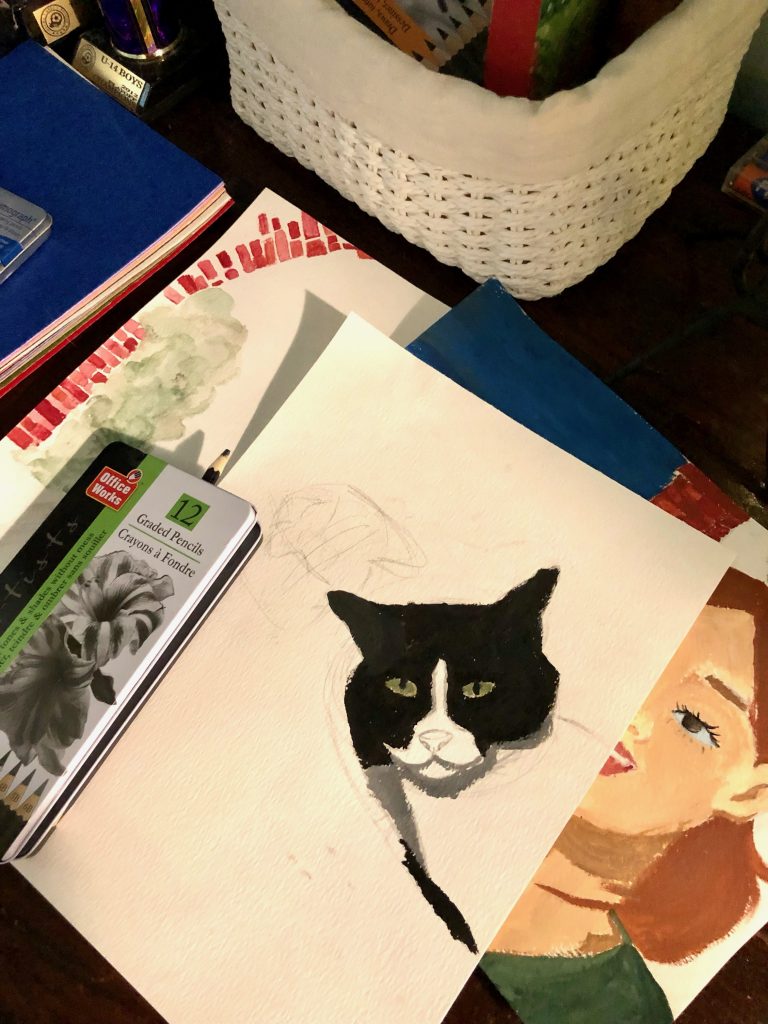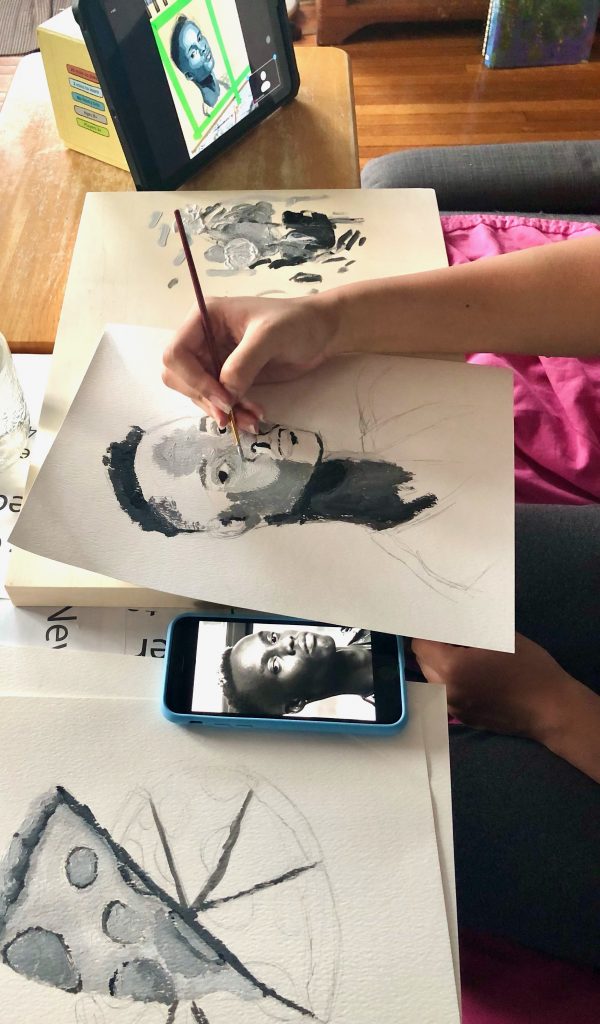A Course of Interest, Workshop, Webinar and More
Curricula can be notoriously hard to stick to. It isn’t always, but it can be! Take a glance at the number of homeschool blog posts about switching and moving around of curriculum. Or perhaps a parent is drawn to a curriculum while a child is not. Or in my case, vice versa!
One of my children periodically enjoys the idea of curricula, or at least that’s how I’ve interpreted it at times. After a period of diving into a variety of open-ended things for a while and just generally living a great life, it’s not unusual for her to seek out something more structured, something that re-aligns her day a little, and throws an anchor down, giving her room to sway to all sides, but still keeping a specific focus. Now that she’s solidly into her teens, I’m noticing this more again as she contemplates her future path a little more.
Sometimes the request is general. “I think I’d like to have more structure in my day.” We talk about what she might be wanting and try to narrow it down. Sometimes she asks if I’d like to try something with her. That led to us learning some Latin together in the evenings over the past several months. It also helped her find a rhythm to her days and a time of day to dive back into other languages as well.
Other times she takes me up on an offer to do something consistent together. That could be watching a certain TV series the same time each week. We enjoy the regularity of looking forward to things on a particular day of the week.
Sometimes it’s not set times that she’s looking for. It’s more of a deep focus. She has done her own deep dive into illustrating and working on some short stories and poems over the past several months. I asked if she’d like to set some time aside each day to dig into children’s literature. We made a huge list of books to reserve from the library, put them on hold and picked them up from three different library branches. We had so much fun noticing the particulars of eras, cultures, illustrations and writing styles of all kinds of poetry and stories. She is inspired by both story and art. And humour. Ironic humour!
The most natural thing to do when someone mentions they’d like more structure is often to look for a curriculum. At first thought, this seems to make sense. A curriculum can provide a straightforward path laid out in incremental steps. It provides a clear framework of study and specific instructions along the way. There’s an answer key or teacher’s guide that specifies whether you’re on track and how to get there in the first place. This seems to be the obvious path for someone who is stating they’d like to add direction to their week.
Here’s the thing though … We’ve tried this in different ways, always flexibly, when this request for more structure comes up. We’ve had some really enjoyable times, but even the most beautiful curriculum used in the most flexible way hasn’t quite hit the mark. Maybe this is familiar to you too?
The last few months have given me time to see that what’s being looked for might be fresh inspiration rather than specific structure. Possibly it’s a new direction and set of ideas, but not necessarily a scope and sequence. I’ve begun to wonder if the term “wanting more structure” can sometimes be a catch-all for that feeling of uncertainty before a period of growth.
Enter short courses, webinars and workshops …
We’ve had a great opportunity to take advantage of some art workshop series that have been presented virtually over this pandemic year in a way that might not have been as available previously. We’ve tapped into a couple of art galleries and organizations offering virtual short courses or workshop series that range from a single time slot, to a longer running set of dates. These are open to all people of any age and that just feels so different.
What’s worked really well for her are workshops with 2-4 sessions. She did a Storytelling through Digital Photography short series earlier in the spring and is currently awaiting the second of two painting workshops to explore the use of gouache paints. The first workshop was a few evenings ago and was two virtual hours of painting alongside an artist and a few other participants. It was well enjoyed and the inspiration has continued through the following days. She’s been painting, using the new gouache paints, much of the time since.
As for the Storytelling Through Digital Photography workshops, she worked with focus to complete her photo essay for the second workshop and it did lead her to wanting to find something else related. She found something she wants to pursue and she’s just beginning a 12 week self-paced course. Knowing her as I do, I think she will likely set her time up so that it works out in 12 weeks. For many people, though, the self-paced option might mean that they work through the process either more quickly or slowly.
On another note, we found a few online creative writing webinars that were happening each week, and she tapped into those (and loved them) while they lasted.
This has all reminded me of how many ways there are for kids to take in the information and develop the skills they might be seeking around something other than using a curriculum. Particularly as kids get older, there are increasing opportunities to learn things in the way adults do … with research, networking, choice and open-ended possibilities. Not all kids are looking to add more structure, but if they are, there are all sorts of choices out there.
Short courses, webinars and workshops are some of those possibilities. They bring a different energy to learning than curriculum does for a few reasons:
There is often a greater diversity of age. Whereas a curriculum is generally geared to a particular age and a range on either side of that, these other options tend to be open to whoever shares the interest. Participants can learn from others of all stages of life.
They are geared specifically to people with that particular interest. Rather than being watered down, hyped up or designed to hook the “student” in and get them to learn a particular subject, there is an assumption that the registrants want to be there. They are choosing to be there and the delivery of the information reflects that.
There can be a feeling of seriousness (in a good way) and authenticity. You’re listening directly to someone who is an expert in their field. They are speaking in ways that are specific to the industry. If you’re watching a tech webinar of some kind, for example, you’ll be hearing terms in the context of natural conversation, not as part of a vocabulary list as you might be within a curriculum. If you’re tapping into a series or group related to nature conservation, you’ll be hearing biological terms in natural conversation, not as bolded key words within textbook paragraphs.
There are often opportunities to network with others in the workshop or course. This might not happen as easily in something like a webinar, but in live courses or workshops, you can often exchange ideas or contact information and possibly even business ideas. It gives you direct interaction with others that share the same area of interest.
There might be apprenticeship or mentorship opportunities that branch off from the workshop or course. In the last three small workshop series that my daughter has been part of, the facilitators were sponsored by an arts organization and it seemed that they either had their own small business or were interested in sharing information without an interest in payment. My sense is that there could be opportunities to connect for further guidance, either casually or in a more formal arrangement.
They are a fantastic source for gathering information. Webinars might be these best for this. Because there isn’t the production/performance element that is usually found to some degree in a course or workshop, a webinar is a great way to simply collect ideas or build on existing knowledge. The creative writing webinars and literature webinars have been such an inspiring way to sit back and listen. You can jot down notes, but you don’t have to. You can follow up on suggested resources if you’d like. It really has the feel of adult learning or a university lecture, rather than the step by step scope and sequence of a curriculum.
The material is relevant to the learner. You can tap into the specifics of what you’re interested in. Our brains focus on what’s engaging and necessary to us, which is why most people have forgotten a whole lot of the information they learned in textbooks. We usually have some takeaways – sure – but the things we remember stood out because they were relevant to us at the time. So a webinar or workshop or even a specific course can offer either a solid introduction or a deep dive into something you’re really primed to engage with.
They can be short-term and inexpensive. The workshop series are often short enough that you can expand if you like, but don’t have to if you’d rather not. Many of these are free and others are reasonable.
They feel concrete. Sometimes, particularly as kids get older, I find, there is more pressure for them to define how to their time is being spent. Everywhere you go, it seems people want to know their plans. What direction are they going in? This can be a lot of external pressure. It can also feel limiting to tie yourself and your time into a direction you’re not sure about. Courses of choice, workshops and webinars are a great alternative – they can give a taste of something and you can decide whether to go deeper or not.
What if your child is still drawn to curriculum instead or as well as these options? Then go for it! Curriculum can be a valuable way to learn something, particularly for certain learning styles or someone looking for some linear, organized steps. A lot of curriculum is very attractive and for people who tend to appreciate the visual – colour, font, layout – that piece on its own can be exciting.
Life is full to the brim of learning opportunities and a curriculum is certainly one of those. You just don’t need to feel that purchasing and using a curriculum is the only option if your child is asking to add in something new or is looking to lay down a few more roots in their day.
If your child does use a curriculum, they don’t need to feel bound by it. Neither do you. Use it in the way that makes sense. Sometimes there is a definite purpose to learning a certain way. In their later teen years, some of my kids have taken provincial credits as prerequisites for future plans as needed. They enjoyed aspects of them and recognized the pieces that were limiting and stale. It was just a matter of naming the compromise if they needed or wanted it. Sometimes the compromise didn’t make sense based on what they needed/wanted so they looked for another path.
Some ways to find courses, workshops and webinars:
Check out local organizations such as libraries, art galleries, arts organizations, science or history museums, astronomy groups and see if they offer anything of interest. Many of these may be free. Libraries almost always have various workshops on the go. Bookmark a list of TedTalks you might be interested in. Check out places like Outschool and Coursera.
Not all people search for additional structure for themselves beyond the daily rhythm already happening. My daughter is the only member of our family who has periods of verbally seeking this out. It actually isn’t how I learn at all. That being said, when a child does ask for more structure, it doesn’t mean they aren’t a self-directed learner or can’t determine their path. It means they are self-aware enough to know that engaging with someone else for ideas and support might add more options to their path. They are tapping into different possibilities!
There are many ways to find resources for exploring something specific if a child or teen is interested. One of our favourites has been mentorship and apprenticeship opportunities.
These offer an opportunity to engage directly with something they’d like to try. That interest is often the initial driving force, but over time, so many other aspects can blossom as well. There are business aspects, leisure aspects, pieces around the practicality such as upkeep and choosing materials or networking and socializing. For a child or teen looking for something new and anchoring, a mentorship or apprenticeship might fit the bill. It also might not, and that’s fine … it’s just more information to move away and maybe onto something else.
Think creatively! Apprenticeships and mentorships aren’t limited to the trades or arts. A historian or museum curator might might love to spend time with a young person who has a shared interest. A game developer might enjoy connecting and demonstrating their process. A sports coach might be more than happy for an extra set of hands.
It can be formal or informal. One to one or a connection within a group. Paid or unpaid.
A note about unpaid versus paid mentorships …
When people are really passionate about their trade or area of expertise, they are often enthusiastic to share… sometimes very enthusiastic.
A retired person might be keen to set up a regular time or offer some guidance and interaction on a regular basis. They may have books or materials they are itching to share or even pass on.
A nature and conservation organization might have work that a child or teen can do either on a regular basis with a leader there or as part of a volunteer team. Volunteering can absolutely offer a form of apprenticeship experience. M worked as part of a volunteer crew that was an integral part of a provincial park, building and repairing boardwalks, forest trail footpaths and accessibility ramps to beaches and washrooms. The learning was tremendous. People were happy to pass down knowledge and everyone was working without pay.
We’ve had the same experience with the audiovisual system at church. G worked at that for years and gained a lot of knowledge, not just about the equipment and managing it in different ways, but also about interacting with a team of volunteers.
However, sometimes we might be looking for something really clear from someone. Even if they’re excited to share their knowledge freely, there is a reality to them committing a certain day a week, sharing their space and resources. If we want to be highly prioritized in their week and have access to professional level materials, it’s often reasonable to pay and pay fairly, even generously, when we can.
Sometimes people can’t pay and mentors don’t want or need payment and that’s great too, but we do need to be cognizant of what it is we’re asking. As mentioned above, if we’re thinking about someone taking a child or teen under their wing as part of a volunteer organization, that is likely a great free opportunity. Additionally, a situation in which a teen is doing work alongside someone might be helpful to both the more experienced person as well as to the less. That’s more of an apprenticeship model and would make sense for it to be free (in fact, your teen may actually end up being the one making some money).
However, a mentorship that is requested and is using a fair bit of another person’s committed time, space and materials should be up for a fairly negotiated exchange of some kind, in my opinion, especially if you want it to be valued on both ends so that it is enduring.
So there we go … so many ways to learn! You can use curriculum if you and your child decide to (after some thought, my daughter has zeroed in on one for writing she’d like to work with this summer), but if you do have a child who is looking for a new direction, know that there are options. Think about the way that you as an adult might go about accessing information. It’s really not that different!

Enjoy this post? Please share.

